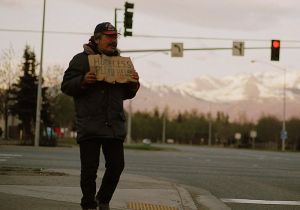17 February
2012
Reframing the Economic Debate: Personal Responsibility and the American Homeless
Posted in Built Environment, Ethics in Business, Human Life, Political Economy, Public Policy, Social Commentary, United States of America, World Affairs
At present it is hard to feel anything other than gloom about economic news. Unemployment fugures are high and firms struggle to access much-needed finance. The current global orthodoxy for governments is that of ‘necessary cuts’. Deepening ‘doom and gloom’ the credit rating agency Moody’s has this week noted a negative outlook for the UK economy. France and Austria have received a similar diagnosis, whilst ratings for Italy, Spain and Portugal has been lowered.
The gloom is present in the United States of America, too. Almost four million homes were repossessed by American banks in 2011. The unemployment rate fell by about one per cent over the last year, but remains high at 8.5% (January 2012) and amounts to some fourteen million people. Figures from the census bureau show the number of Americans living below the poverty line as forty-nine million.
Recently reporters from both BBC Newsnight and BBC Panorama reported with a focus upon growing homelessness in America. It is not a new or alien problem there, for the American narrative includes the stories of vagrants and travelling labourers. Embodied in the image of the itinerant worker is something of the ‘American Dream’: men prepared to travel in search of work and in hope of one day achieving success. Consider Of Mice and Men and The Adventures of Huckleberry Finn. Then there is Steinbeck’s novel, The Grapes of Wrath, which presents the Joad family. They are forced to travel from Oklahoma to California to find work but not the comfortable circumstances of their dreams. The current economic malaise affects Oklahoma and California alike.
The BBC documentaries show families living in homeless shelters and cheap roadside motels. Young married couples appear living in ‘tent cities’, or even, in one case, in a flood water drain below a Las Vegas road. The estimated number of homeless children is one and a half million.
At a political level there is debate over the level of State involvement in the economy. Those who want less State action suggest that the continued economic slump is a direct result of high taxation and high government spending. Reduce these, they believe, and the economy will begin to grow. Those who favour State action argue that only through welfare payments, government- funded infrastructure projects and assisted industrial development will America come through the crisis.
The human element does not feature in the debate. The Occupy movement claims to represent ordinary people and is right to focus on a lack of concern for the common good evident in the financial sector over recent years. Unfortunately, it limits its action to protesting in Wall Street and other such places. Unlike Church groups and charities it makes no real effort to assist the homeless.
We do not need cosmetic legislative meddling, but a proper rebalancing of the economy and a focus on sustainable rather than rapid growth. Work must be valued as essential to human dignity.
Politicians should seek to foster personal responsibility in their societies. That emphatically does not mean that individuals ought to be concerned solely with their own welfare as if concern for others were an infringement of their personal responsibility. It should, rather, be understood as the realising of one’s responsibility for the good of all, and that not only in leisure time but also in the very midst of one’s work. A businessman’s responsible decisions should seek to enhance the common good in the long term.
In the short term action does indeed need be taken to alleviate the dire circumstances of the homeless and jobless. Government action might perhaps be usefully directed to utilisation of the many empty homes in America. Some short-term subsidising of housing costs for families unable to maintain a home could provide the stable foundation necessary for families to function properly. Homelessness in a land with almost nineteen million empty homes does seem scandalous. We read of the hopes of travelling families in The Grapes of Wrath: ‘If we can get work it’ll be fine. Won’t have no cold in the winter. Kids won’t freeze on the way to school. I’m gonna take care my kinds don’t miss no more school.’ It is tragic that so families in America are having to live with the same hopes once more.
Leave a Reply